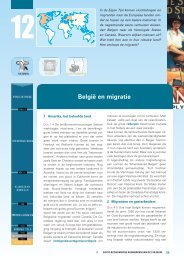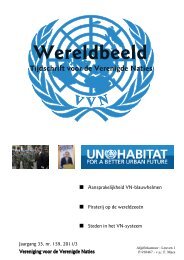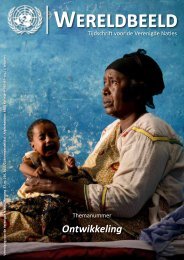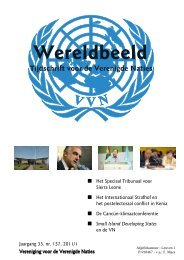Annex 5: United Nations Security Council Resolution 1874 (2009)
Annex 5: United Nations Security Council Resolution 1874 (2009)
Annex 5: United Nations Security Council Resolution 1874 (2009)
You also want an ePaper? Increase the reach of your titles
YUMPU automatically turns print PDFs into web optimized ePapers that Google loves.
humanitarian and developmental purposes directly addressing civilian needs; and on all Member States<br />
not to provide public financial support for trade with that country where such support could contribute to<br />
the country’s nuclear-related or ballistic missile-related or other “WMD”-related programmes or activities.<br />
Deciding to adjust the measures imposed by paragraph 8 of 1718, including through the<br />
designation of entities, goods, and individuals, the <strong>Council</strong> directed the “1718” Committee to undertake<br />
its tasks to that effect and to report to the <strong>Council</strong> within 30 days. If the Committee had not so acted,<br />
then the <strong>Council</strong> would complete action to adjust the measures within seven days of receiving that<br />
report.<br />
The <strong>Council</strong> called on all Member States to report to it within 45 days, and thereafter upon the<br />
Committee’s request, on concrete measures taken to implement key provisions of the resolution. It<br />
pledged to keep the actions of the Democratic People’s Republic of Korea under continuous review and to<br />
consider strengthening, modifying, suspending or lifting the measures in light of the country’s<br />
compliance with both resolution 1718 (2006) and today’s text. It underlined that further decisions would<br />
be required, should additional measures be necessary.<br />
Following adoption of today’s resolution, the representative of the Republic of Korea said the<br />
<strong>Council</strong>’s action was an expression of the international community’s firm will to collectively respond to<br />
the Democratic Republic of Korea’s provocative action. Its nuclear test violated relevant <strong>Council</strong><br />
resolutions and seriously threatened peace and stability on the Korean peninsula and beyond. Its overt<br />
declaration of intent to pursue development of its nuclear weapons programme was a grave challenge to<br />
the nuclear non-proliferation regime.<br />
He urged the Democratic People’s Republic of Korea to comply with today’s resolution and to<br />
carefully heed the united voice of the international community that such actions would never be<br />
condoned. The country must refrain from any act that would further aggravate the situation on the<br />
Korean peninsula. He strongly urged the country to rejoin the six-party talks and to abandon all of its<br />
nuclear weapons and missile programmes, once and for all.<br />
Japan’s representative demanded that the Democratic People’s Republic of Korea heed the<br />
message of the resolution and strongly urged that country to return immediately to the talks, without<br />
precondition. He highlighted the importance of the <strong>Council</strong>’s expansion of sanctions and its demand that<br />
the Democratic People’s Republic of Korea not conduct any further nuclear tests or ballistic missile<br />
launches, that it cease all other prohibited nuclear activities and that it respond to the humanitarian<br />
concerns of the international community. Hopefully, those measures would induce the Democratic<br />
People’s Republic of Korea to change its course of action. It was essential for all Member States to take<br />
the necessary action to implement those provisions, which were not intended to harm the innocent<br />
people of the country.<br />
The <strong>United</strong> States delegation, which had co-sponsored the resolution -- along with France,<br />
Japan, Republic of Korea, and the <strong>United</strong> Kingdom -- welcomed its unanimous adoption as a strong and<br />
united international response to North Korea’s test of a nuclear device. The message of the text was<br />
clear -- that that country’s behaviour was unacceptable to the international community, which was<br />
determined to respond. The country should return, without conditions, to peaceful dialogue and honour<br />
its previous commitments to denuclearize the Korean peninsula. But, for now, its choices had led it to<br />
face markedly stronger sanctions. The measures contained in the text were innovative, robust and<br />
unprecedented, and represented new tools to impair North Korea’s ability to proliferate.<br />
China supported the balanced reaction of the <strong>Security</strong> <strong>Council</strong>, its representative said, stressing<br />
that the Democratic People’s Republic of Korea had violated <strong>Security</strong> <strong>Council</strong> resolutions, impaired the<br />
effectiveness of the nuclear non-proliferation regime and affected international peace and stability. The<br />
text showed the determination of the <strong>Council</strong> to resolve the “DPRK nuclear issue” peacefully, through<br />
dialogue and negotiations. And in that context, China had voted in favour of it.<br />
At the same time, he stressed that the sovereignty, territorial integrity and legitimate security<br />
concerns and development interests of the Democratic People’s Republic of Korea should be respected.<br />
After its return to the Nuclear Non-Proliferation Treaty, that country would enjoy the right to the peaceful<br />
use of nuclear energy as a State party. The <strong>Council</strong>’s actions, meanwhile, should not adversely impact<br />
the country’s development, or humanitarian assistance to it. As indicated in the text, if the country<br />
complied with the relevant provisions, the <strong>Council</strong> would review the appropriateness of suspending or<br />
lifting the measures. The issue of inspections was complex and sensitive, and countries must act<br />
prudently and under the precondition of reasonable grounds and sufficient evidence, and refrain from<br />
any words or deeds that might exacerbate conflict. Under no circumstances should there be the use of<br />
force or threat of the use of force.<br />
Statements were also made by the representatives of the <strong>United</strong> Kingdom, Mexico, Viet Nam,<br />
Libya, Uganda, Russian Federation, France, Burkina Faso, Austria, Croatia, Costa Rica and Turkey.<br />
The meeting was called to order at 12:10 p.m. and adjourned at 1:05 p.m.<br />
© <strong>2009</strong> – Dr. D. Criekemans – Negotiations in UNSC on the continuing security provocations by North Korea 41







